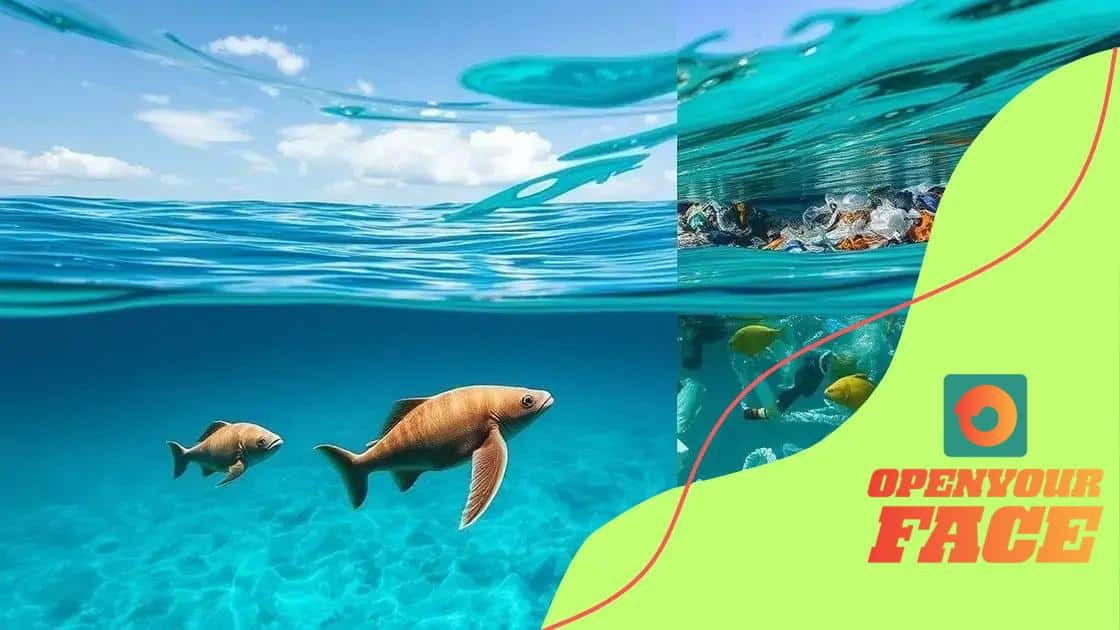Global efforts to curb plastic pollution in the oceans

Global efforts to curb plastic pollution in the oceans involve innovative technologies, community actions, and strong regulations aimed at reducing waste and protecting marine ecosystems.
Global efforts to curb plastic pollution in the oceans are becoming increasingly critical as the health of our marine environments hangs in the balance. Have you ever considered how your daily choices impact our oceans? In this article, we’ll delve into the initiatives and innovations that aim to reduce plastic waste and protect aquatic life.
Understanding plastic pollution in oceans
Understanding plastic pollution in oceans is vital for everyone. Every year, millions of tons of plastic waste end up in our seas, causing severe harm to marine life and ecosystems. So, what can we do to combat this growing issue?
The Impact of Plastic Pollution
Plastic pollution affects our oceans in various ways. As plastics break down into smaller pieces, they create microplastics. These tiny particles are ingested by marine animals, which can lead to toxic contamination in the food chain.
- Destruction of coral reefs
- Impact on marine wildlife
- Disruption of local fishing industries
Marine animals such as turtles and seabirds often mistake plastic for food. This not only endangers their health but also threatens entire ecosystems that rely on these species. If we do not take steps to reduce this pollution, the consequences could be dire for marine biodiversity.
Sources of Plastic Waste
Understanding where plastic pollution originates helps us find solutions. Single-use plastics are among the biggest culprits. Items like straws, bags, and bottles are used briefly but persist in the ocean for hundreds of years.
- Improper waste disposal
- Stormwater runoff carrying litter
- Plastic production industry
It is crucial to recognize that our daily habits contribute significantly to the problem. By making small changes, such as reducing plastic usage and promoting recycling, we can make a difference.
Sometimes it feels overwhelming to tackle such a vast issue, but collective efforts can lead to significant changes. Governments, organizations, and individuals can work together to create effective solutions. Emphasizing awareness and education about plastic pollution can inspire action.
Key global initiatives against plastic waste
Key global initiatives against plastic waste play a significant role in the fight against ocean pollution. Various organizations and governments are taking a stand, working towards cleaner oceans and a sustainable future. It’s essential to know what these initiatives entail and how they impact our environment.
International Treaties and Agreements
One effective strategy is the establishment of international treaties. These agreements help countries collaborate on reducing plastic waste globally. For example, the Montreal Protocol has been adapted to address plastic pollution by targeting key issues.
- Ocean Conservancy’s Trash Free Seas Initiative
- UN Environment Programme’s Clean Seas Campaign
- European Union’s Plastic Strategy
These initiatives aim to unify efforts worldwide, encouraging countries to commit to reducing the amount of plastic waste entering the oceans. By setting clear goals, they promote accountability among nations.
Community Involvement and Grassroots Movements
In addition to governmental efforts, community involvement is crucial. Grassroots movements have sparked significant changes by raising awareness about plastic pollution. Local clean-up events and educational programs allow communities to actively participate in solutions.
- Beach clean-up campaigns
- Recycling education initiatives in schools
- Local legislation on single-use plastics
These initiatives empower individuals to make a difference while fostering a sense of responsibility towards the environment. Engaging communities in the fight against plastic waste is a valuable approach that illustrates the power of collective action.
Moreover, businesses are also stepping up, embracing sustainable practices. Many companies are committing to reducing their plastic footprint by switching to eco-friendly packaging and supporting recycling efforts. This trend indicates a growing recognition of the need for change across all sectors of society.
Innovative solutions: technology and community action

Innovative solutions involving technology and community action are essential in addressing plastic pollution. By combining cutting-edge tools and local initiatives, we can work towards a cleaner ocean and healthier ecosystems. Let’s explore how these two approaches are making a difference.
Technology in Action
Advancements in technology provide powerful tools to combat plastic waste. For instance, AI-driven systems help identify and track plastic pollution in oceans, allowing for more effective clean-up strategies. With satellite imaging, organizations can pinpoint areas with high plastic concentration.
- Plastic-eating robots that collect waste
- Apps for reporting litter and pollution
- Smart bins that sort recyclables automatically
These technological innovations not only enhance efficiency but also encourage data-driven approaches to tackle waste management. Communities can leverage these tools to gain insights and develop tailored solutions for their unique challenges.
Community Action: A Collective Effort
While technology plays a crucial role, community action proves equally significant. Local groups are organizing clean-up drives and educational campaigns to raise awareness about plastic pollution. They inspire change by engaging citizens in hands-on activities.
- Monthly beach clean-ups
- Workshops on recycling and reducing plastic use
- Collaborating with schools to promote environmental education
These actions create a sense of ownership and responsibility among community members. When people see the impact of their efforts, they are more likely to adopt sustainable practices in their daily lives.
The interconnection between technology and community action creates a powerful force for change. By using innovative tools while fostering local engagement, we can create a comprehensive strategy to address plastic pollution effectively. Together, these efforts pave the way for a more sustainable future.
Impact on marine life and ecosystems
The impact of plastic pollution on marine life and ecosystems is profound and alarming. Every year, countless marine animals suffer due to plastic waste that ends up in our oceans. Understanding this impact is crucial for safeguarding our precious marine ecosystems.
Threats to Marine Species
Many marine species face significant threats from plastic pollution. For example, sea turtles often mistake plastic bags for jellyfish, leading to ingestion and serious health problems. Similarly, birds can consume plastic debris, which can cause internal injuries or death.
- Species like whales can become entangled in discarded fishing gear.
- Fish ingest microplastics, which can enter the human food chain.
- Coral reefs suffer as plastic waste smothers and damages these delicate ecosystems.
The cascading effects on marine life emphasize the need for immediate action to reduce plastic waste entering our oceans.
Effects on Ecosystems
Plastic pollution also disrupts entire marine ecosystems. As plastics break down, they release harmful chemicals into the water. These toxins can impact the health of marine organisms and lead to imbalances within the ecosystem.
- Disturbances in food chains can occur, affecting predator-prey relationships.
- Habitat degradation can make areas less viable for marine life.
- Coastal ecosystems, like mangroves, can be harmed by plastic waste washing ashore.
Healthy marine ecosystems are vital for biodiversity, and protecting them from plastic pollution is essential for preserving the balance of life in our oceans. By addressing plastic waste, we can help restore and maintain the health of marine environments.
Future outlook on plastic reduction efforts
The future outlook on plastic reduction efforts holds promise as awareness and innovation continue to grow. People around the world are starting to recognize the serious consequences of plastic pollution. This increased awareness drives the demand for effective solutions to reduce plastic waste.
Emerging Technologies
As technology advances, new methods for plastic reduction are becoming available. Innovations in materials are leading to the development of bio-degradable plastics that can significantly reduce the persistence of plastic in the environment. Several companies are exploring alternatives made from natural sources, which can help in minimizing plastic waste.
- Bioplastics made from plant materials
- Innovative recycling processes that recover more plastic
- Artificial intelligence aiding in waste sorting
These technologies not only provide alternatives but also improve existing recycling systems, making them more efficient and effective.
Legislation and Policies
Government action plays a vital role in the future of plastic reduction. Many countries are implementing stricter regulations on single-use plastics. Initiatives such as bans on plastic bags and incentives for using reusable products are becoming more common.
- Extended Producer Responsibility (EPR) laws
- Plastic waste reduction targets
- Support for community recycling programs
Effective legislation can drive significant change by holding companies accountable for their plastic usage and encouraging sustainable practices.
Global collaborations are also enhancing efforts to combat plastic pollution. Countries are coming together to share best practices and develop joint strategies for tackling plastic waste. International agreements can facilitate more coordinated and impactful actions.
With ongoing efforts from individuals, communities, and governments, there is a hopeful future for reducing plastic waste. The combination of awareness, innovative solutions, and strong policies can lead to a cleaner, healthier planet.
FAQ – Frequently Asked Questions about Plastic Pollution Efforts
What are the main causes of plastic pollution in oceans?
The primary causes include single-use plastics, improper waste disposal, and stormwater runoff that carries litter into waterways.
How can I reduce my plastic use in daily life?
You can reduce plastic use by opting for reusable bags, avoiding bottled water, and using biodegradable products when possible.
What role do organizations play in fighting plastic pollution?
Organizations lead clean-up efforts, create awareness campaigns, and advocate for policies that limit plastic production and use.
How does plastic pollution affect marine life?
Plastic pollution harms marine life through ingestion, entanglement, and habitat degradation, leading to severe health issues and population declines.






